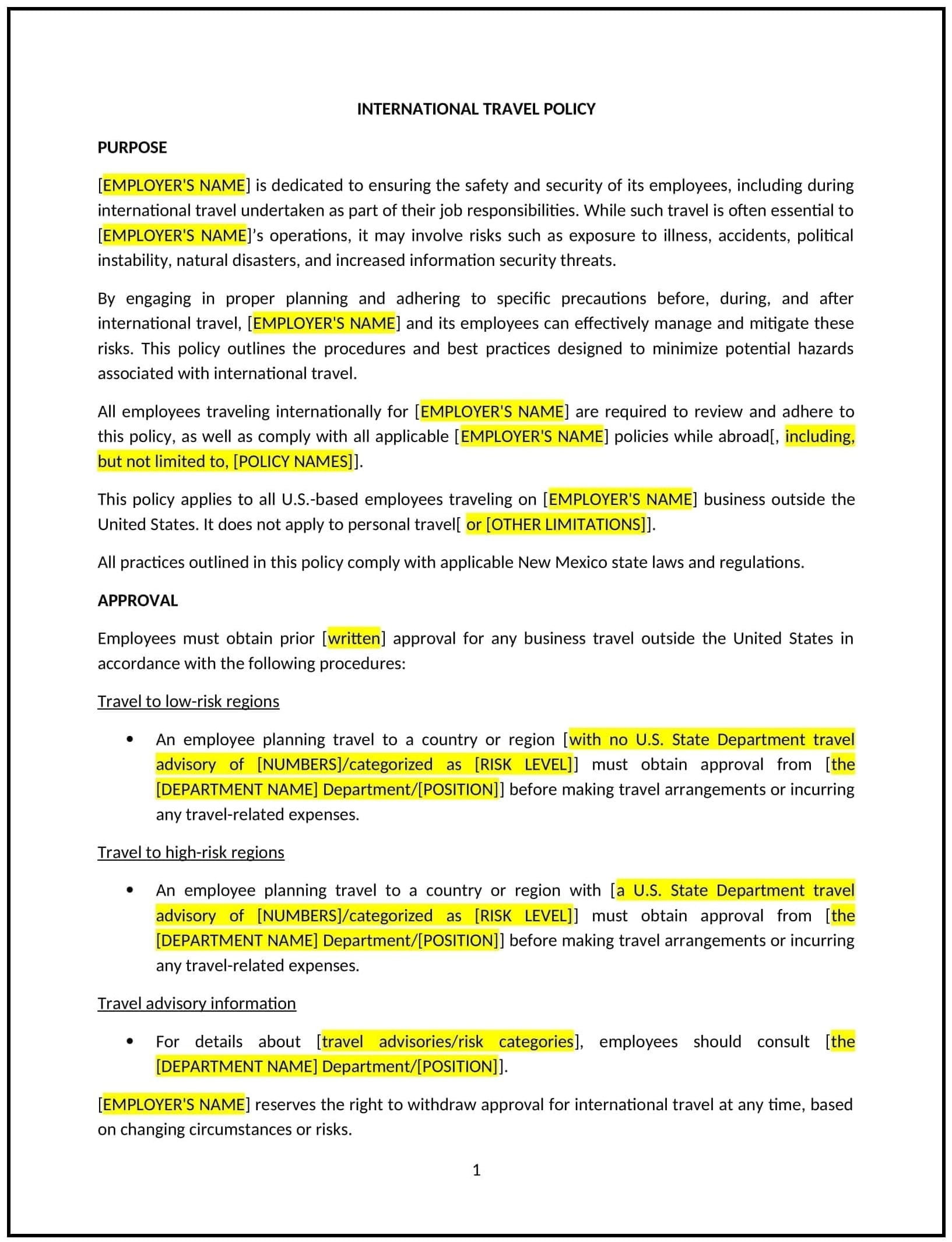International travel policy (New Mexico): Free template
Got contracts to review? While you're here for policies, let Cobrief make contract review effortless—start your free review now.

Customize this template for free
International travel policy (New Mexico)
This international travel policy is designed to help New Mexico businesses manage and oversee employee travel for business purposes outside of the United States. It outlines the procedures for booking, reimbursing, and ensuring safety during international trips, as well as the company’s expectations for employees while traveling abroad.
By adopting this policy, New Mexico businesses can streamline travel management, ensure consistency and cost control, and safeguard employees while they are on business trips internationally.
How to use this international travel policy (New Mexico)
- Define business travel purposes: Specify what constitutes business travel, including attending conferences, meeting with clients, conducting research, or managing international offices. Make it clear that only business-related travel is covered under the policy.
- Set travel approval processes: Outline the process employees must follow to request approval for international travel. This may include submitting a travel request form and obtaining approval from a manager or department head.
- Outline travel arrangements: Specify how travel arrangements should be booked, including preferred travel agencies, booking tools, and the class of travel (economy, business, etc.). Businesses may choose to book all flights, accommodations, and transportation in advance or allow employees to make their own arrangements within company guidelines.
- Clarify expenses and reimbursements: Clearly outline what expenses are covered (e.g., flights, accommodations, meals, transportation) and the reimbursement process. Define spending limits and procedures for submitting receipts and expense reports.
- Reflect New Mexico-specific considerations: Address any New Mexico-specific considerations that may impact international business travel, such as tax deductions, insurance, or compliance with specific state regulations related to employee travel.
Benefits of using this international travel policy (New Mexico)
Implementing this policy provides New Mexico businesses with several advantages:
- Streamlines travel management: A clear, structured policy helps manage and streamline international travel, reducing confusion and ensuring that travel arrangements are consistent and cost-effective.
- Ensures employee safety: By outlining safety protocols, insurance coverage, and emergency procedures, businesses can ensure the well-being of employees while traveling abroad.
- Promotes cost control: Establishing clear guidelines for travel arrangements, spending limits, and reimbursement procedures helps businesses keep travel expenses within budget and prevent unnecessary spending.
- Enhances compliance: Having a well-defined international travel policy helps businesses comply with any applicable regulations or company-specific rules regarding international business travel.
- Reduces administrative burden: Clear guidelines on travel approval, bookings, and reimbursements reduce the administrative work required to process international trips, freeing up time for other important business functions.
Tips for using this international travel policy (New Mexico)
- Communicate the policy clearly: Ensure all employees are familiar with the international travel policy, especially those who frequently travel for business. Provide the policy in the employee handbook and review it during orientation or onboarding.
- Monitor and track travel arrangements: Implement a system to track international travel requests, approvals, bookings, and expenses. This ensures that travel arrangements are in line with company policy and budget guidelines.
- Offer travel safety training: Provide employees with training on travel safety, cultural awareness, and emergency procedures when traveling abroad. This training can help employees navigate unfamiliar environments safely and with confidence.
- Set up travel insurance: Ensure that employees traveling internationally are covered by appropriate travel insurance, including coverage for health, accidents, trip cancellations, or other unforeseen events.
- Regularly review the policy: Periodically review the international travel policy to ensure it meets the evolving needs of the business, complies with any new regulations, and incorporates any employee feedback.